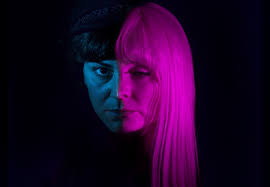Pros: Two fascinating women onstage, sans men.
Cons: Somehow, men still feel like the focus. Two spot on performances of two interesting women, but overall result feels dated.
Summary
Rating
Good
It’s 1968. Nico (Polly Wiseman), a model and singer and muse of Andy Warhol, is asleep in the Chelsea Hotel in Manhattan. Her sleep is disturbed by the arrival of Valerie Solanas (Sophie Olivia), a writer and radical feminist who is in the hotel to shoot a scene with the elusive Warhol, who Solanas says also happens to have the only copy of a play she’s written, which she wants back. Whilst they sit waiting for Nico’s drugs to arrive, the women get chatting.
Solanas is remembered for two main things: her SCUM Manifesto (Society for Cutting Up Men) which urged women to ‘overthrow the government, eliminate the money system […] and eliminate the male sex,’ and for attempting to shoot Andy Warhol in 1968: ‘I consider it a moral act. I consider it immoral that I missed.’ Christa Päffgen, better known as Nico, was a German singer, model and actress, is remembered for being a Warhol superstar, singing with The Velvet Underground, and her list of lovers: Lou Reed, Brian Jones and Jim Morrison, to name a few.
So often, prominent women are remembered because of the men they were around, not because of what they themselves did. In this way women become whom they do, not what they do. Nico had a chaotic sounding life; Solanas was something of a bad-ass, and vocal about it. They are two women who surely were so much more than the obvious. I’m always thrilled to go to see a play about women, by women. I enjoyed Femme Fatale, and these characters are not women one sees being resurrected too often, if at all. But it isn’t enough to resurrect the fascinating women of history if only to have them put on the same old LP.
Wiseman and Olivia as Nico and Solanas respectively are spot on, each of them hitting the perfect tone of the women they’re portraying, and make a pleasing visual contrast: Nico with her severe hair cut and (sort of) smart outfit; Solanas with her messy hair, baker boy cap and check shirt. These are two women who might have been seen at the Trump protest last week, rather than figures from a decade almost fifty years gone. There was some great dialogue, valiant use of a difficult space (Wilton’s Music Hall is rather oversized for an intimate conversation piece like Femme Fatale), and imagined encounters between real people are a fertile and interesting way to evaluate, interpret and consider past events.
I do feel, however, that as much as I enjoyed the piece, the ways in which it handles women, their societal relationships with men, how they need to push things forward, are as old as the era Nico and Solanas came to prominence in. Which is understandable. It’s a play set in the sixties, dealing with two women’s relationships with themselves, and the men around them. But when Solanas broke the fourth wall to take the microphone and preach her manifesto whilst haranguing the males unfortunate enough to be seated near the front, I couldn’t help but think that if two women spending fifty-five minutes alone together are still only shown spending that time together analysing their relationships with and finding their common ground in the men around them. . . I can’t help but think the record should have been changed long ago.
Written by: Polly Wiseman
Booking until: This was a one off performance
Directed by: Nathan Evans
 Everything Theatre Reviews, interviews and news for theatre lovers, London and beyond
Everything Theatre Reviews, interviews and news for theatre lovers, London and beyond



